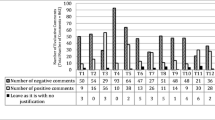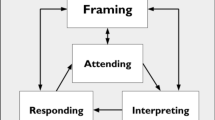Abstract
In this paper, I examine deficit talk, utterances that depict students and/or families based on their perceived deficits, in an equity-oriented professional development (PD) setting. Researchers often attribute deficit talk by mathematics teachers (MTs) to their biased beliefs and perceptions. From an interactional approach, namely conversation analysis and discursive psychology, I offer an alternative perspective on how deficit talk is produced in PD interactions. The analysis shows the rhetorical functions of deficit talk, which are designed for MTs to manage their accountability with a range of potential issues and to portray themselves as competent teachers. The analysis also reveals the action-performing nature of deficit talk (e.g., refusing a request) situated in the social interaction. To conclude, this paper suggests that mathematics teacher educators need to attend to the micropolitical nature of deficit talk and their co-participation in the production of deficit talk as they formulate ways to respond to deficit talk in PD interactions.

Similar content being viewed by others
Notes
All names are pseudonyms.
References
Adiredja, A. P. (2019). Anti-deficit narratives: Engaging the politics of research on mathematical sense making. Journal for Research in Mathematics Education, 50(4), 401–435.
Aguirre, J., Mayfield-Ingram, K., & Martin, D. (2013). The impact of identity in K-8 mathematics: Rethinking equity-based practices. National Council of Teachers of Mathematics.
Barwell, R. (2003). Discursive psychology and mathematics education: Possibilities and challenges. ZDM, 35(5), 201–207.
Barwell, R. (2009). Researchers’ descriptions and the construction of mathematical thinking. Educational Studies in Mathematics, 72(2), 255.
Barwell, R. (2013). Discursive psychology as an alternative perspective on mathematics teacher knowledge. ZDM, 45(4), 595–606.
Battey, D., & Franke, M. (2015). Integrating professional development on mathematics and equity: Countering deficit views of students of color. Education and Urban Society, 47(4), 433–462.
Bonilla-Silva, E. (1997). Rethinking racism: Toward a structural interpretation. American Sociological Review, 62, pp. 465–480.
Clift, R., Veal, M. L., Johnson, M., & Holland, P. (1990). Restructuring teacher education through collaborative action research. Journal of Teacher Education, 41(2), 52–62.
Dominguez, H. (2016). Weakening deficit perspectives with collective agency a commentary on Koestler’s case. In D. Y. White, S. Crespo, & M. Civil (Eds.), Cases for mathematics teacher educators: Facilitating conversations about inequities in mathematics classrooms (pp. 121–124). Information Age.
Edwards, D. (1997). Discourse and cognition. Sage.
Featherstone, H., Crespo, S., Jilk, L. M., Oslund, J. A., Parks, A. N., & Wood, M. B. (2011). Smarter together! Collaboration and equity in the elementary math classroom. National Council of Teachers of Mathematics.
Felton-Koestler, M. D. (2017). Mathematics education as sociopolitical: Prospective teachers’ views of the What, Who, and How. Journal of Mathematics Teacher Education, 20(1), 49–74.
Forrester, M. A., & Pike, C. D. (1998). Learning to estimate in the mathematics classroom: A conversation-analytic approach. Journal for Research in Mathematics Education, pp. 334–356.
García, S. B., & Guerra, P. L. (2004). Deconstructing deficit thinking: Working with educators to create more equitable learning environments. Education and Urban Society, 36(2), 150–168.
Garfinkel, H. (1967). Studies in ethnomethodology. Prentice Hall.
Garmon, M. A. (2004). Changing preservice teachers’ attitudes/beliefs about diversity: What are the critical factors? Journal of Teacher Education, 55(3), 201–213.
Gorski, P. (2011). Unlearning deficit ideology and the scornful gaze: Thoughts on authenticating the class discourse in education. Counterpoints, 402, 152–173.
Goffney, I. M. (2016). Challenging deficit language. In D. Y. White, S. Crespo, & M. Civil (Eds.), Cases for mathematics teacher educators: Facilitating conversations about inequities in mathematics classrooms (pp. 389–3394). Information Age.
Gutiérrez, R. (2015). Nesting in Nepantla: The importance of maintaining tensions in our work. In N. M. Joseph, C. Haynes, & F. Cobb (Eds.), Interrogating Whiteness and relinquishing power: White faculty’s commitment to racial consciousness in STEM classrooms (pp. 253–282). Peter Lang.
Gutstein, E., & Peterson, B. (2005). Rethinking mathematics: Teaching social justice by the numbers. Rethinking Schools.
Herbel-Eisenmann, B., Choppin, J., Wagner, D., & Pimm, D. (Eds.). (2012). Equity in discourse for mathematics education. Springer.
Hepburn, A., & Bolden, G. B. (2017). Transcribing for social research. Sage.
Hepburn, A., & Brown, S. D. (2001). Teacher stress and the management of accountability. Human Relations, 54(6), 691–715.
Heritage, J. (1984a). A change-of-state token and aspects of its sequential placement. In J. M. Atkinson & J. Heritage (Eds.), Structures of social action (pp. 299–345). Cambridge University Press.
Heritage, J. (1984b). Garfinkel and ethnomethodology. Polity Press.
Heritage, J. (2012). Epistemics in action: Action formation and territories of knowledge. Research on Language and Social Interaction, 45(1), 1–29.
Heritage, J., & Sefi, S. (1992). Dilemmas of advice: Aspects of the delivery and reception of advice in interactions between health visitors and first-time mothers. Talk at work: Interaction in institutional settings (pp. 359–417). Cambridge University Press.
Horn, I. S. (2007). Fast kids, slow kids, lazy kids: Framing the mismatch problem in mathematics teachers’ conversations. The Journal of the Learning Sciences, 16(1), 37–79.
Ingram, J. (2018). Moving forward with ethnomethodological approaches to analysing mathematics classroom interactions. ZDM, 50(6), 1065–1075.
Jefferson, G. (2004). A sketch of some orderly aspects of overlap in natural conversation. In G. H. Lerner (Ed.), Conversation analysis: Studies from the first generation (pp. 43–62). John Benjamins.
Kalinec-Craig, C. A., Bannister, N., Bowen, D., Jacques, L. A., & Crespo, S. (2021). “It was smart when:” Supporting prospective teachers’ noticing of students’ mathematical strengths. Journal of Mathematics Teacher Education, 24, 375–395.
Kitzinger, C. (2012). Repair. In J. Sidnell & T. Stivers (Eds.), The handbook of conversation analysis (pp. 229–256). Wiley-Blackwell.
Koestler, C. (2016). Challenging and disrupting deficit notions in our work with early childhood and elementary teachers. In D. Y. White, S. Crespo, & M. Civil (Eds.), Cases for mathematics teacher educators: Facilitating conversations about inequities in mathematics classrooms (pp. 113–120). Information Age.
Ladson-Billings, G. (2007). Pushing past the achievement gap: An essay on the language of deficit. The Journal of Negro Education, 76, 316–323.
Leonard, J., & Martin, D. B. (2013). The brilliance of Black children in mathematics. Information Age Publishers.
Louie, N., Adiredja, A. P., & Jessup, N. (2021). Teacher noticing from a sociopolitical perspective: the FAIR framework for anti-deficit noticing. ZDM–Mathematics Education, 53(1), 95–107.
Parks, A. N. (2010). Metaphors of hierarchy in mathematics education discourse: The narrow path. Journal of Curriculum Studies, 42(1), 79–97.
Potter, J. (1996). Representing reality: Discourse, rhetoric and social construction. Sage.
Potter, J. (2003). Discourse analysis and discursive psychology. Qualitative research in psychology: Expanding perspectives in methodology and design, pp. 73–94.
Potter, J., & Wetherell, M. (1987). Discourse and social psychology: Beyond attitudes and behaviour. Sage.
Schegloff, E. A. (1997). Whose text? Whose context? Discourse and Society, 8(2), 165–187.
Schegloff, E. A. (2007). Sequence organization in interaction: A primer in conversation analysis (Vol. 1). Cambridge University Press.
Sleeter, C. (2008). Preparing White teachers for diverse students. In M. Cochran-Smith, S. Feiman-Nemser, & D. J. McIntyre (Eds.), Handbook of research on teacher education (3rd ed., pp. 559–582). Routledge.
Solorzano, D. G., & Yosso, T. J. (2001). From racial stereotyping and deficit discourse toward a critical race theory in teacher education. Multicultural Education, 9(1), 2.
Souto-Manning, M., & Swick, K. J. (2006). Teachers’ beliefs about parent and family involvement: Rethinking our family involvement paradigm. Early Childhood Education Journal, 34(2), 187–193.
Speer, S. A. (2004). Gender talk: Feminism, discourse and conversation analysis. Routledge.
Spencer, J. A., & White, D. Y. (2016). Conversations about inequities in graduate and professional-development contexts. In D. Y. White, S. Crespo, & M. Civil (Eds.), Cases for mathematics teacher educators: Facilitating conversations about inequities in mathematics classrooms (pp. 333–337). Information Age.
Stokoe, E. (2015). Identifying and responding to possible -isms in institutional encounters: Alignment, impartiality, and the implications for communication training. Journal of Language and Social Psychology, 34(4), 427–445.
Strutchens, M., Bay-Williams, J., Civil, M., Chval, K., Malloy, C. E., White, D. Y., D’Ambrosio, B., & Berry, R. Q. (2012). Foregrounding equity in mathematics teacher education. Journal of Mathematics Teacher Education, 15(1), 1–7.
Suh, H., Theakston-Musselman, A., Herbel-Eisenmann, B., & Steele, M. D. (2013, October). Teacher positioning and agency to act: Talking about “low-level” students. Paper presented at the 35th annual meeting of the North American Chapter of the International Group for the Psychology of Mathematics Education, Chicago, IL.
Tainio, L., & Laine, A. (2015). Emotion work and affective stance in the mathematics classroom: The case of IRE sequences in Finnish classroom interaction. Educational Studies in Mathematics, 89(1), 67–87.
Tiezzi, L. J., & Cross, B. E. (1997). Utilizing research on prospective teachers’ beliefs to inform urban field experiences. The Urban Review, 29(2), 113–125.
Turner, E., Aguirre, J., Drake, C., Bartell, T. G., Roth McDuffie, A., & Foote, M. Q. (2015). Community Mathematics Exploration Module. In C. Drake et al. (Eds.), TeachMath Learning Modules for K-8 Mathematics Methods Courses. Teachers Empowered to Advance Change in Mathematics Project. Retrieved from: www.teachmath.info
Valencia, R. R. (2010). Dismantling contemporary deficit thinking: Educational thought and practice. Routledge.
Watson, D., Charner-Laird, M., Kirkpatrick, C. L., Szczesiul, S. A., & Gordon, P. J. (2006). Effective teaching/effective urban teaching: Grappling with definitions, grappling with difference. Journal of Teacher Education, 57(4), 395–409.
White, G. M. (1990). Moral discourse and the rhetoric of emotoin. In C. A. Lutz and L. Abu-lughod (Eds.), Language and the Politics of Emotion. Cambridge University Press.
Whitehead, K. A., & Stokoe, E. (2015). Producing and responding to-isms in interaction. Journal of Language and Social Psychology, 34(4), 368–373.
Acknowledgements
I thank the A3IMS (Access, Agency, and Allies in Mathematical Systems) project team as well as the teachers and students who graciously allowed me time with them. The project team included: Joel Amidon, Tonya Gau Bartell, Sunghwan Byun, Missy D. Cosby, Michael Eiland, Mary Q. Foote, Victoria Hand, Frances Harper, Beth Herbel-Eisenmann, Brent Jackson, Sheeba Johnson, Durrell Jones, Courtney Koestler, Gregory Larnell, Carlos LópezLeiva, Oyemolade Osibodu, Timothy Roberts, Ashley D. Scroggins, Anita Wager, and Ayşe Yolcu. I also thank Beth Herbel-Eisenmann, Jennifer VanDerHeide, Christopher Dubbs, Lee Melvin Peralta, four anonymous reviewers, and the editor for their insightful comments.
Funding
This work is based upon work supported by National Science Foundation (US) under the Grant Number DRL-1417672. Any opinions, findings, and conclusions or recommendations expressed in this article are those of the author and do not necessarily reflect the views of NSF.
Author information
Authors and Affiliations
Corresponding author
Additional information
Publisher's Note
Springer Nature remains neutral with regard to jurisdictional claims in published maps and institutional affiliations.
Rights and permissions
About this article
Cite this article
Byun, S. Interactional production of deficit talk in a professional development for mathematics teachers. J Math Teacher Educ 26, 53–78 (2023). https://doi.org/10.1007/s10857-021-09519-y
Accepted:
Published:
Issue Date:
DOI: https://doi.org/10.1007/s10857-021-09519-y




